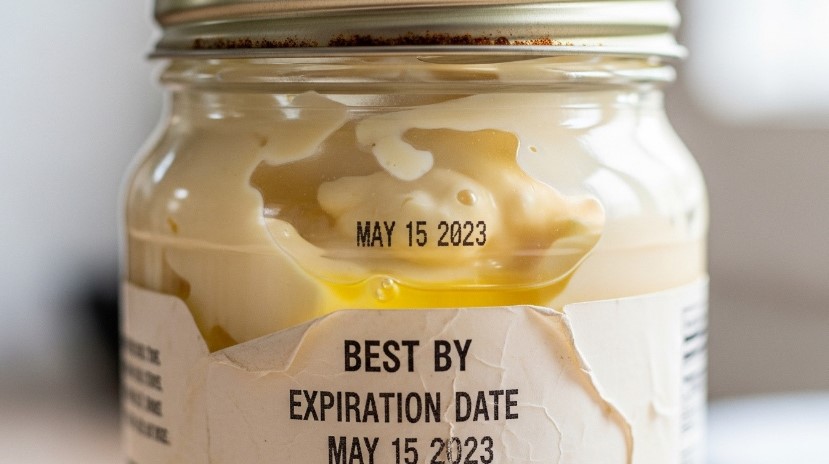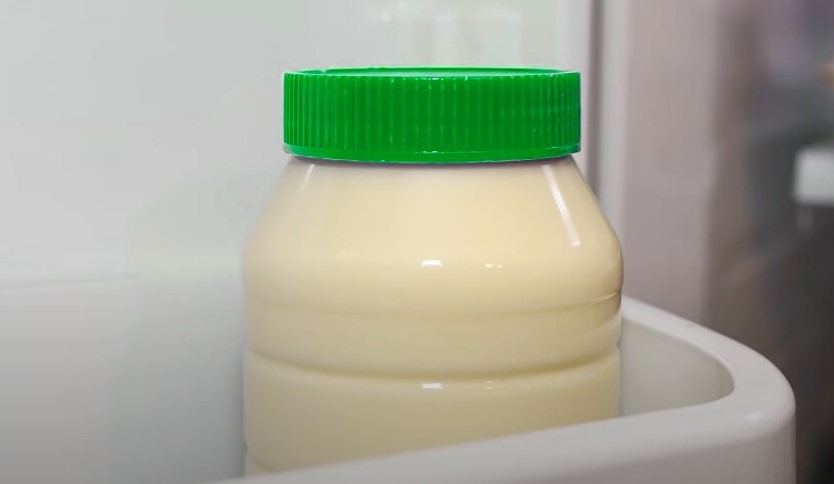The concrete answer is this: eating expired mayonnaise can make you sick, and the risk depends on how far past its expiration date it is, whether it has been opened, and how it was stored. Commercially packaged mayonnaise usually contains pasteurized eggs, vinegar, lemon juice, and preservatives that make it more shelf-stable than homemade versions.
Still, once it goes bad, it can harbor dangerous bacteria such as Salmonella, E. coli, or Listeria. If you eat expired mayonnaise, you may experience mild symptoms like stomach cramps, nausea, and diarrhea, or in more severe cases, full-blown food poisoning that requires medical treatment.
This is not one of those foods you can always “take a chance on.” With mayonnaise, the combination of eggs and oil makes it particularly sensitive to spoilage.
Shelf Life of Mayonnaise
The shelf life depends on whether the mayonnaise is unopened or opened, and whether it is store-bought or homemade.
| Type of Mayonnaise | Unopened Shelf Life (Past Expiry) | Opened Shelf Life | Notes |
| Store-bought (commercial) | 2–3 months past “best by” if refrigerated and sealed | 1–2 months in the fridge | Contains preservatives, safer but not indefinite |
| Homemade | 1 week in the fridge | 3–5 days once opened | No preservatives, high risk of bacterial growth |
| Left unrefrigerated (any type) | Unsafe after 2 hours | Unsafe | Bacteria can multiply rapidly at room temperature |
What Happens If You Eat Expired Mayonnaise?

1. Mild Effects
When mayonnaise is only slightly past its printed expiration date, say, a week or two, and has been kept sealed or consistently refrigerated, the risks are relatively low. In this case, the mayonnaise may not be harmful, but could lose its quality. The texture often becomes thinner, the flavor sharper or more acidic, and the smell more pronounced. You might notice a tangy or stale aftertaste that makes sandwiches or salads less appetizing. While most healthy adults will not develop illness from eating a small amount of slightly expired mayonnaise that has been stored properly, it’s not worth consuming if you detect even minor signs of spoilage, such as oil separation, discoloration, or an odd odor.
These are indicators that the product has started to break down chemically, and though the effects may be mild, eating it regularly in that state can irritate the stomach and digestive tract over time.
2. Digestive Discomfort
The next level of risk appears when the mayonnaise has been open for too long or improperly handled. Bacterial growth and rancid oils in spoiled mayonnaise can trigger digestive discomfort. Within a few hours of eating it, you may begin to feel bloating and pressure in the abdomen as your gut bacteria react to the spoiled food.
Gas buildup is common, and stomach cramps often follow, ranging from a dull ache to sharp twisting pains. Loose stools or mild diarrhea may occur as your body attempts to flush out the spoiled material quickly.
These symptoms usually pass within a day for healthy individuals, but they can still disrupt normal activities and cause dehydration if fluid loss is not replaced. It is worth noting that rancid oils, which develop when fats break down over time, can be irritating even without bacterial contamination. The body treats these as foreign substances and reacts with inflammation and intestinal distress.
3. Food Poisoning
The most serious outcome occurs when mayonnaise is far beyond its expiration date, stored incorrectly, or left out unrefrigerated for several hours. In such conditions, harmful bacteria like Salmonella, E. coli, or Listeria can grow rapidly. Eating mayonnaise contaminated with these pathogens can lead to full-blown food poisoning. Symptoms usually begin within a few hours but can take up to two days to appear.
Common signs include intense nausea, repeated vomiting, severe abdominal pain, and diarrhea, which may in some cases be bloody. Fever, chills, and body aches often follow as the body mounts an immune response. Dehydration becomes a real danger if vomiting and diarrhea are persistent, especially in people who cannot keep fluids down.
Older adults and those with compromised immune systems may develop severe infections that require hospitalization. In rare cases, untreated foodborne illness from spoiled mayonnaise can lead to complications like kidney failure (particularly with certain strains of E. coli).
Signs Your Mayonnaise Has Gone Bad

| Spoilage Sign | What It Means | Safe to Eat? |
| Sour or strong vinegar smell | Bacterial growth | No |
| Discoloration (yellow, brown) | Rancid oils or mold | No |
| Separation (oil pooling on top) | Start of spoilage, quality loss | Risky |
| Mold spots | Fungal contamination | Absolutely not |
| Bitter or sharp taste | Chemical breakdown | No |
Health Risks from Expired Mayonnaise
The health risks come mainly from bacterial contamination.
| Bacteria | Common Source | Symptoms | Risk Level |
| Salmonella | Eggs in mayo | Diarrhea, fever, cramps | High |
| E. coli | Cross-contamination | Severe diarrhea, kidney damage | High |
| Listeria | Improper storage | Fever, muscle aches | Dangerous for pregnant women |
| Staphylococcus aureus | Dirty utensils | Nausea, vomiting, cramps | Moderate |
How to Handle Mayonnaise Safely

- Refrigerate immediately after opening – Keep below 40°F (4°C).
- Use clean utensils only – Avoid cross-contamination.
- Do not leave out for more than 2 hours – especially in warm weather.
- Check “best by” dates – For store-bought mayo, a sealed jar can last longer, but once opened, time matters more than the printed date.
- Discard homemade mayo quickly – Never keep it more than a week.
Safer Substitutes and Alternatives
If you’re worried about mayonnaise spoiling, consider alternatives that last longer:
- Greek Yogurt: Tangy and protein-rich, lasts longer in the fridge.
- Hummus: Made from chickpeas, safe for several weeks refrigerated.
- Avocado Mash: Naturally creamy, but should still be consumed within 1–2 days.
What To Do If You Ate Expired Mayonnaise
@big.simon009 guess who back, back again. #returnofthemayo #eatwithme #eat #foodtok #bigsimon #bigsi #fyp
- If no symptoms: Stay hydrated, monitor your body.
- If mild nausea or stomach upset: Rest, sip clear fluids, eat bland foods (rice, toast, bananas).
- If severe symptoms (vomiting, fever, bloody diarrhea, dehydration): Seek medical attention immediately.
Final Thoughts
Expired mayonnaise is not always deadly, but it’s one of the higher-risk foods where safety margins are thin. Commercial mayo can sometimes be safe shortly past its expiration if sealed and refrigerated, but once it’s been opened or mishandled, the risk rises quickly. Homemade mayo is even more fragile and should be treated with extra caution.
Hi there, my name is Kelly Barlow and kellytoeat.com is my blog. Here, I write about various recipes I want to reccommend to readers.
I try to find the best possible recipes that can attract the attention of readers, and at the same time, I strive to write it in the most engaging manner possible.
When I was younger, I wanted to become a chef. Sadly, it wasn’t meant to be, but at the very least, I write about it.
